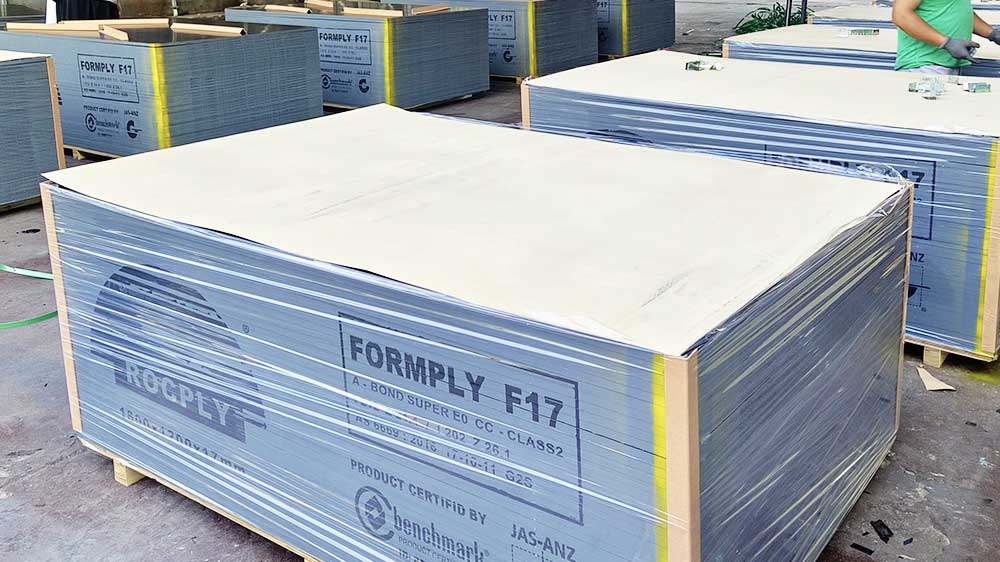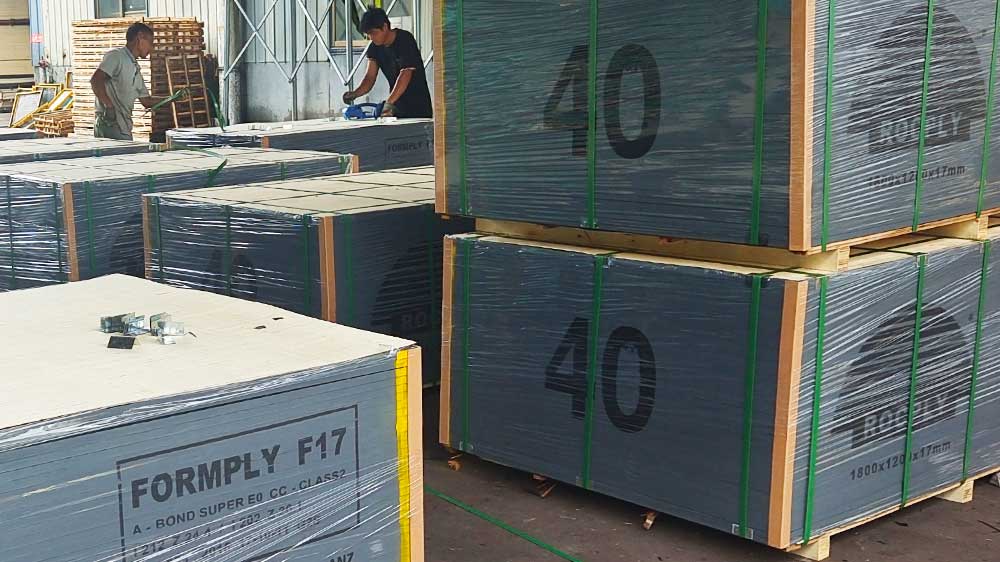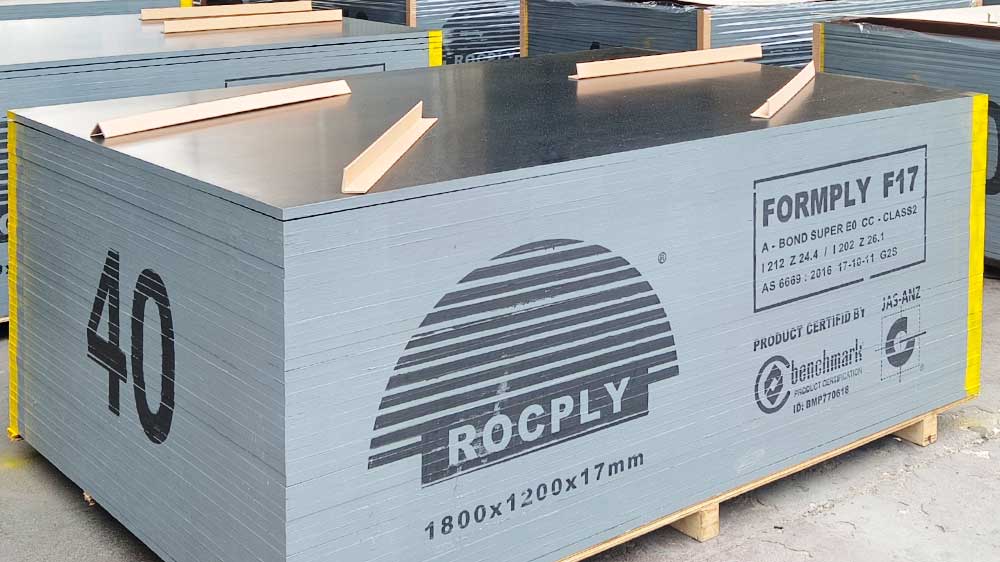What is Formply Sizes?
Formply sizes refer to the various dimensions and thicknesses available for formply, a specially designed plywood used in concrete formwork. Formply is known for its strength, smooth finish, and resistance to moisture. It is a critical material in the construction industry. Formply is especially used for forming concrete structures like walls, slabs, and columns. It is typically made with a high-density overlay (HDO) or phenolic film facing. This coating prevents concrete from sticking to the plywood. It allows for multiple reuses and reduces the overall cost of formwork.
Formply comes in a range of standard sizes. Common sizes include 1220mm x 2440mm (4′ x 8′) and 1200mm x 2400mm. These dimensions are popular due to their convenience and compatibility with most formwork systems. Thicknesses generally range from 12mm to 21mm, with 17mm being especially popular. F17 grade formply is known for its high load-bearing capacity and durability under pressure. These sizes and specifications cater to different structural requirements. Builders can choose the right formply size based on the specific needs of their project.
Understanding Formply Sizes
Standard Formply Sizes
Formply is available in several standard sizes, designed to meet the needs of most construction projects. The most common size is 1200mm x 2400mm, which provides a convenient and manageable panel for a wide range of applications. This size is often preferred for its versatility, fitting well within most formwork systems and providing a balance between coverage and ease of handling.
Key Sizes:
- 1220mm x 2440mm (4′ x 8′): The most widely used size, suitable for general formwork applications.
- 1200mm x 2400mm: A slightly smaller but equally popular size, often used interchangeably with the 1220mm x 2440mm panels.
- 1500mm x 3000mm: Used for larger projects that require fewer joints, providing a more seamless finish.
Thickness Options
The thickness of formply plays a crucial role in its performance, particularly in terms of load-bearing capacity and durability. Thicker panels offer greater strength and can withstand higher stress, making them suitable for heavy-duty applications. Common thickness options include:
Thickness Choices:
- 12mm: Ideal for light-duty formwork where minimal load is expected.
- 15mm: Offers a good balance of strength and weight, commonly used in moderate applications.
- 17mm: The standard choice for F17 formply, providing excellent load-bearing capacity.
- 18mm: Used in high-stress environments where additional strength is required.
- 21mm: The thickest standard size, designed for the most demanding structural applications.
Special Sizes and Custom Options
In addition to standard sizes, formply can be manufactured in custom dimensions to meet specific project requirements. These special sizes are often used in large-scale projects where minimizing joints is critical, or in complex formwork where unique shapes are needed.
Special Applications:
- Custom Sizes: Tailored to specific projects, reducing waste and optimizing material usage.
- Oversized Panels: Used in large-scale construction to minimize seams and improve the quality of the concrete finish.
Formply F17 Sizes and Their Applications
What Makes F17 Formply Special?
F17 formply is a specific grade of formwork plywood. It is tested and certified for high strength and load-bearing capacity. The F17 rating ensures that the plywood meets stringent standards for structural applications. This makes it a reliable choice for heavy-duty formwork. F17 formply is commonly used where formwork must withstand significant pressure. This includes high-rise buildings, bridges, and other major infrastructure projects.
F17 Formply Sizes:
- 1220mm x 2440mm (17mm thickness): The most popular F17 size, balancing strength and ease of use.
- 1200mm x 2400mm (17mm thickness): Provides the same performance as the larger size but with slightly different dimensions, offering flexibility in formwork design.
Key Applications of F17 Formply
F17 formply is used extensively in commercial and industrial construction due to its robust performance characteristics. Its strength, durability, and smooth finish make it ideal for forming concrete in demanding environments.
Common Uses:
- High-Stress Formwork: Perfect for applications that require formwork to bear significant loads.
- Infrastructure Projects: Used in the construction of bridges, tunnels, and other large-scale structures.
- Repetitive Use: The durability of F17 formply allows it to be reused multiple times, reducing costs over the course of a project.
Advantages of Different Formply Sizes
Standard vs. Custom Sizes
Choosing between standard and custom formply sizes depends on the specific requirements of the project. Standard sizes offer convenience and are readily available, while custom sizes can be tailored to fit unique applications, minimizing waste and maximizing efficiency.
Standard Sizes:
- Availability: Easily sourced from suppliers, making them ideal for quick turnaround projects.
- Versatility: Suitable for a wide range of formwork designs, from simple to complex.
Custom Sizes:
- Reduced Joints: Larger panels reduce the number of seams, improving the quality of the concrete finish.
- Tailored Fit: Custom dimensions ensure that the formply fits perfectly, enhancing structural integrity.
Choosing the Right Thickness
The choice of thickness is critical to ensuring that the formply performs as needed. Thinner panels are suitable for less demanding applications, while thicker panels provide the necessary strength for heavy-duty formwork.
Thickness Recommendations:
- 12mm to 15mm: Best for light to moderate formwork, such as residential slabs and walls.
- 17mm to 21mm: Ideal for commercial and industrial formwork, especially where high loads are expected.
Formply Sizes for Different Construction Needs
Benefits of Using Standard Formply Sizes
Standard formply sizes provide several advantages in construction, including easy availability, compatibility with most formwork systems, and straightforward handling. The consistency of these sizes allows contractors to plan and execute projects efficiently, ensuring a smooth workflow from start to finish.
Key Benefits:
- Ease of Use:Standard sizes fit well with commonly used formwork systems, reducing the need for adjustments.
- Cost Efficiency:Readily available sizes help keep costs down, as custom production is not required.
- Quick Installation:Standard sizes simplify the formwork setup, saving time and labor on the job site.
Enhanced Durability with Formply F17 Sizes
F17 formply sizes offer enhanced durability and strength, making them a preferred choice for more demanding construction environments. The F17 rating ensures the plywood can withstand the stresses of heavy-duty formwork, maintaining its integrity and performance across multiple uses.
Durability Features:
- Multiple Reuses:F17 formply can be reused several times without losing its structural integrity, providing long-term value.
- Resistant to Wear:The phenolic film facing protects against abrasion, moisture, and chemicals, extending the lifespan of the formply.
- High Load Capacity:Suitable for applications that require robust support, such as large slabs and high walls.
Special Considerations When Selecting Formply Sizes
Project Specifics and Formply Selection
Selecting the right formply size depends on the specific requirements of the project, including the scale of the formwork, the expected loads, and the desired finish quality. Contractors must consider these factors when choosing between standard and custom sizes, as well as the appropriate thickness.
Factors to Consider:
- Load Requirements:Heavier loads necessitate thicker formply, such as 17mm or 21mm, to ensure safety and structural stability.
- Surface Finish:The choice of size and thickness can impact the smoothness of the concrete finish, with fewer joints providing a more seamless appearance.
- Reusability:High-quality formply, especially F17 grades, offer superior reusability, making them more cost-effective in the long run.
Environmental and Safety Standards
Formply is designed to meet stringent environmental and safety standards, ensuring that it is suitable for use in all types of construction. This includes adherence to formaldehyde emission standards and the use of environmentally friendly adhesives and coatings.
Safety and Compliance:
- Low Emissions:Formply often meets low formaldehyde emissions standards, contributing to safer working conditions.
- Sustainable Sourcing:Many manufacturers use sustainably sourced timber, supporting eco-friendly construction practices.
FAQs (Frequently Asked Questions)
Q: What are the standard formply sizes available?
A: The most common formply sizes are 1220mm x 2440mm and 1200mm x 2400mm, available in various thicknesses from 12mm to 21mm.
Q: Why choose F17 formply over standard formply?
A: F17 formply offers superior strength and load-bearing capacity, making it ideal for demanding applications that require robust formwork.
Q: Can formply be cut to custom sizes?
A: Yes, formply can be cut to custom sizes to meet specific project requirements, reducing waste and ensuring a perfect fit.
Q: How many times can formply be reused?
A: High-quality formply, especially those with phenolic film facing, can be reused multiple times, depending on how well it is maintained and the conditions of use.
Q: Is formply resistant to water and chemicals?
A: Yes, formply is designed to resist water and chemicals, thanks to its phenolic or plastic film facing, which protects against moisture and prevents concrete adhesion.
Q: What thickness of formply should I use for my project?
A: The thickness of formply depends on the application. For light-duty formwork, 12mm to 15mm is sufficient, while 17mm to 21mm is recommended for heavy-duty applications.
Post time: Sep-28-2024




